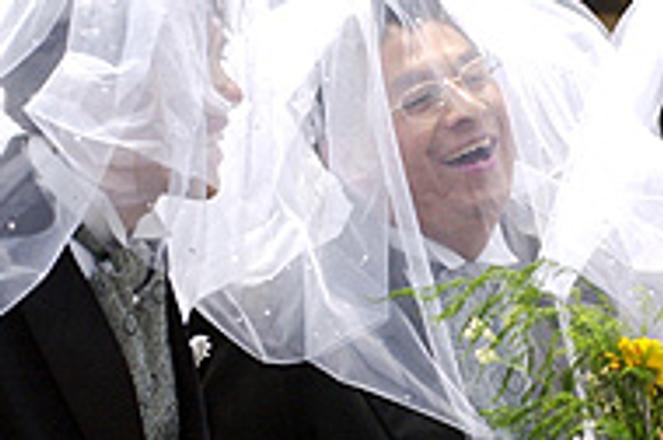THE KDH wants to keep the benefits of marriage out of the hands of homosexuals.photo: TASR
THE CHRISTIAN Democratic Movement (KDH) is working on a law that would deny state benefits to parents who do not raise children within traditional heterosexual wedlock.
The conservative party argues that a family consisting of a man, a woman, and children deserves special protection and those living in something other than a heterosexual partnership should not be granted benefits that the state gives to working spouses who have children.
The privileges that the state grants to heterosexual parents include a widow's or widower's pension, tax relief, and the possibility to adopt children.
"These benefits will not apply to any forms of partnership other [than heterosexual marriage]," said Justice Minister Daniel Lipšic.
But it seems unlikely the draft law would be passed in parliament; politicians from other parties have called it unnecessary and some have argued that such a law would be unjust to children living in single-parent households.
The KDH wants to gather enough support to pass the law as constitutional legislation, meaning 90 of the total 150 MPs would have to vote for it.
KDH representatives said their initiative was driven by fears of the possible legalisation of homosexual marriage, which could lead to the adoption of children by homosexual people, a trend the KDH has always strictly opposed. The party also fears what it perceives as liberal trends in the EU, of which Slovakia is set to become a full member in May 2004.
At a press conference on February 21, Lipšic denied arguments that the law would have a negative impact on children who live in single-parent households.
"The constitutional law relates to marriage, that is two adult people who enter wedlock," Lipšic said, adding that the draft would have no effect on children, as they would continue to be granted equal rights based on the existing laws.
"Children must have equal legal protection," the minister said.
Lipšic also said that, unlike the legislation's critics, he did not think that the law would discriminate against those who cannot or do not want to live in heterosexual marriage.
"It is not discrimination. We want to prevent registered [homosexual] partnerships or other forms of coexistence from being on an equal level with [heterosexual] marriages," Lipšic told the Slovak daily Pravda on February 20.
The ruling coalition's liberal party, the New Citizen's Alliance (ANO), and the left wing opposition party Smer opposed the plan. ANO MP Eva Černá said that it was unnecessary to depict an admittedly more liberal Europe as a threat to Slovakia.
"Slovakia is far from recognising registered [homosexual] partnerships or granting them the possibility to adopt children," she said.
ANO chairman Pavol Rusko suggested that such initiatives bear traits of a clerical state and insisted that "the state should not dictate how people live."
Smer MPs said they were convinced that the current laws sufficiently protected families, so a special law was unnecessary.
The KDH has failed to find backing from other parties that describe themselves as Christian.Although individual MPs in the Slovak Democratic and Christian Union said they would consider supporting such a law, most MPs, including those from other parliamentary parties, said they did not think such legislation was required.
Meanwhile, experts dealing with family issues said the law would not guarantee any better protection of children.
"We have plenty of studies showing that there is violence and abuse in traditional families," Erika Kvapilová, head of the Bratislava Centre for Family Studies, said to TV Markíza.


